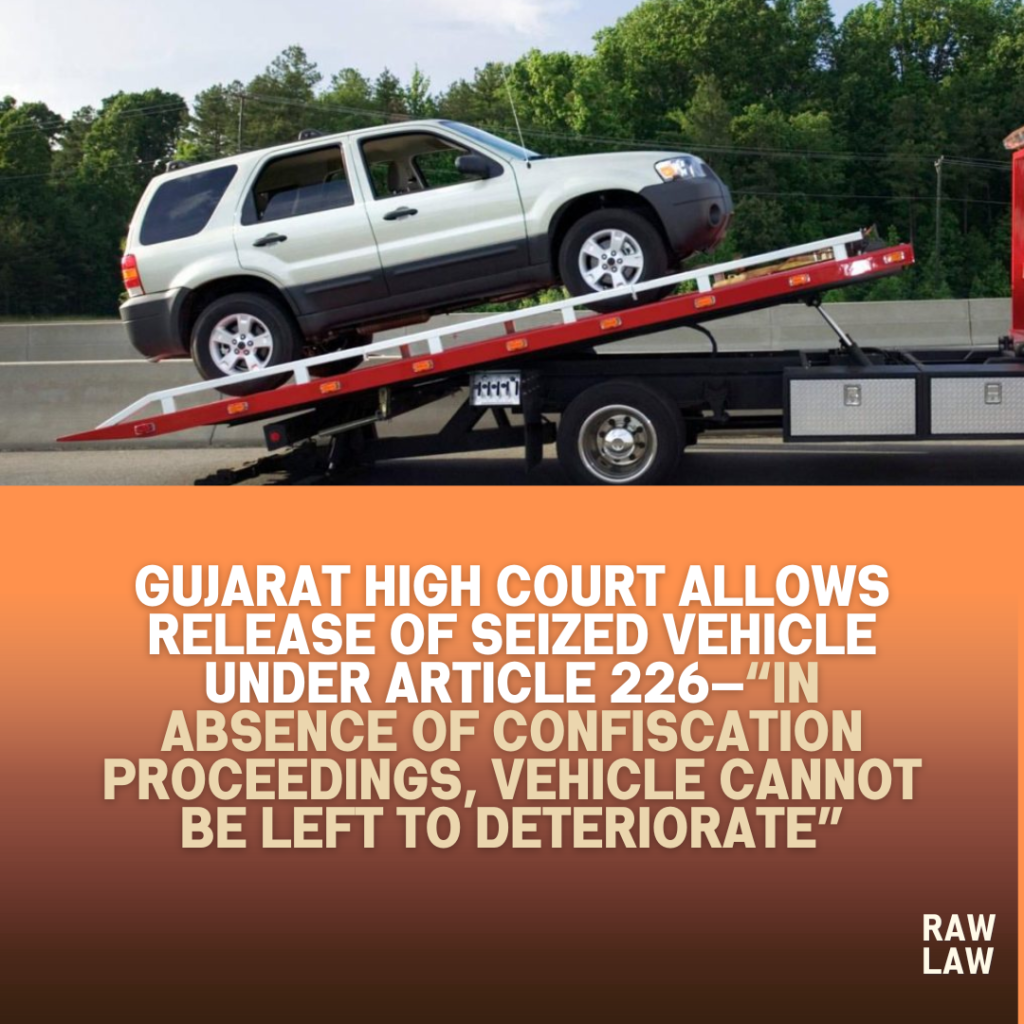Court’s Decision
In a detailed order dated 12 June 2025, the Gujarat High Court allowed the release of a vehicle seized under the Gujarat Prohibition Act, holding that in the absence of any confiscation proceedings under Section 98(2), continued retention of the vehicle at the police station is unwarranted. Invoking its jurisdiction under Articles 226 and 227 of the Constitution and Section 528 of the BNSS (corresponding to Section 482 CrPC), the Court directed the release of the vehicle subject to stringent conditions, including furnishing of solvent surety, undertakings, and future compliance with confiscation proceedings if initiated.
Facts
The vehicle in question—a Baleno Car bearing RTO Registration No. GJ-03-HR-6065—was seized by the Bajana Police Station, Surendranagar, in connection with C.R. No. 11211058230269 of 2023 under the Gujarat Prohibition Act. Police, acting on a tip-off during patrol, intercepted the vehicle and found it to be carrying liquor without valid permit or pass. No confiscation or auction proceedings were initiated under the Prohibition Act following the seizure, and the vehicle remained stationary at the police station.
The petitioner, a finance company, approached the High Court seeking release of the vehicle, invoking its powers under the Constitution and BNSS.
Issues
- Whether the High Court can direct release of a vehicle seized under the Gujarat Prohibition Act when no confiscation proceedings have been initiated?
- Whether such release would be contrary to Section 98(2) of the Prohibition Act as amended?
- What safeguards must be imposed to balance public interest with the petitioner’s proprietary rights?
Petitioner’s Arguments
The petitioner submitted that:
- The Hon’ble Supreme Court in Sunderbhai Ambalal Desai v. State of Gujarat, (2002) 10 SCC 283, discouraged retention of vehicles in police custody, as they become junk over time.
- Since no confiscation or auction proceedings were initiated under Section 98(2) of the Prohibition Act, there was no justification to retain the vehicle.
- The vehicle was financed by the petitioner company, and delay in its release would prejudice their commercial interests.
Respondent’s Arguments
The State opposed the release, arguing:
- The vehicle was used for transporting liquor in contravention of the Gujarat Prohibition Act.
- Section 98 of the Act mandates confiscation for contraventions involving transport of liquor exceeding 20 litres, which applied in this case.
- Given the statutory bar, the case did not merit the exercise of extraordinary jurisdiction.
Analysis of the Law
The Court examined:
- Section 98 of the Gujarat Prohibition Act, particularly sub-section (2) as amended on 31 July 2024, which provides for confiscation of vehicles used in prohibited liquor transportation.
- Section 497 of the BNSS (equivalent to Section 451 CrPC), allowing interim custody of seized property.
- Judgment in Sunderbhai Ambalal Desai, which emphasized that vehicles should not lie unused in police stations pending trial unless legally confiscated.
The Court also referred to Khengarbhai Lakhabhai Dambhala v. State of Gujarat, 2024 INSC 285, to reiterate the limits of police custody over muddamal in the absence of confiscation proceedings.
Precedent Analysis
- Sunderbhai Ambalal Desai v. State of Gujarat – Held that vehicles seized during criminal proceedings should not remain idle and deteriorating at police stations. Interim custody is permissible with conditions.
- Khengarbhai Lakhabhai Dambhala v. State of Gujarat, 2024 INSC 285 – Clarified that post-amendment, if confiscation is not initiated, seizure cannot be indefinite.
Court’s Reasoning
The Court found that:
- No steps had been taken by the authorities to initiate confiscation or auction proceedings despite the amendment to Section 98(2).
- Merely citing that the liquor quantity exceeded 20 litres was insufficient unless backed by action before the Magistrate.
- In light of Sunderbhai Desai, the vehicle should not be left idle and deteriorating, especially when no judicial process of confiscation was underway.
- It was necessary to impose conditions to protect both public interest and the petitioner’s rights.
Conclusion
The High Court allowed the petition and directed the Trial Court to release the seized vehicle, subject to:
- Furnishing a solvent surety equal to the value of the vehicle.
- Filing undertakings not to transfer, repaint, or alter the vehicle.
- Producing the vehicle as and when directed.
- Returning the vehicle if confiscation proceedings are initiated later.
- Allowing the Magistrate to pass future orders under Section 98(2) regardless of current release.
A copy of the order was also directed to be sent to the RTO for a freeze on transfer of ownership pending trial.
Implications
- The judgment reinforces that statutory confiscation must follow due process; absence of timely action cannot prejudice vehicle owners.
- It balances procedural compliance with practical realities of vehicular decay in custody.
- Affirms the continuing relevance of Sunderbhai Desai in the context of BNSS, 2023.
Cases Referred and Their Relevance
- Sunderbhai Ambalal Desai v. State of Gujarat, (2002) 10 SCC 283 – Cited to emphasize need for interim release of vehicles and avoid deterioration.
- Khengarbhai Lakhabhai Dambhala v. State of Gujarat, 2024 INSC 285 – Applied to show that unless confiscation is initiated, seizure cannot be indefinite.



